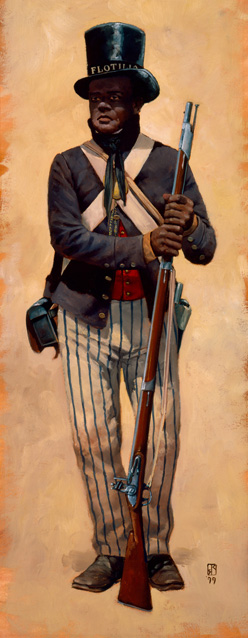When the War of 1812 came in full force to the Chesapeake Bay region, it created new opportunities for slaves who wanted to flee with the British to freedom. During April 1814 Admiral Alexander F. I. Cochrane issued a bold proclamation freeing enslaved people who joined the British cause; this was similar to Lord Dunmore’s attempt to mobilize Virginia blacks during the American Revolution.
Like many enslaved people, Charles Ball used the uncertainties of the era to declare himself free.

NPS
The active presence of British forces in the Chesapeake and along the South Atlantic Coast created opportunities for several thousand enslaved peoples to flee to freedom. Additionally, some 600 former slaves donned uniforms as Colonial Marines and participated in British operations against Washington, Baltimore, and along the South Atlantic. Britain’s campaign in the mid-Atlantic states created a serious problem for American planters: It emboldened slaves to flight while also making the countryside virtually indefensible. Should the American militia be called out to confront a British threat, then slaves had free reign to flee or rise against their masters. British forces exploited that fear, leaving Americans in the region doubly exposed—threatened by a potential British invasion if the militia remained in the neighborhoods or exposed to a potential slave revolt if the militia advanced to meet the British threat. This dichotomy provided slaves with unusual opportunities.
Like many enslaved people, Charles Ball used the uncertainties of the era to declare himself free. Born into slavery around 1780, Ball lived on a Calvert County, Maryland, tobacco farm until the owner’s death forced the liquidation of the estate. About 1800, Ball’s elderly master hired the then-twenty-year-old slave out at the Washington Navy Yard, with Ball becoming a cook aboard the US frigate Congress. Ball fondly remembered his time aboard the ship because officers and sailors treated him well, giving him clothing and money. During this time he also met a host of black sailors who told him stories of freedom in the north and equality at sea. In May 1813, Ball joined a party of white Americans who visited the British fleet in the Chesapeake. He tried unsuccessfully to convince fleeing slaves to return to their masters. Although Ball could have joined with the British and assured his freedom by being evacuated from America, he instead falsely claimed that he was free. When British operations intensified during the spring of 1814, Ball enlisted in Joshua Barney’s Chesapeake flotilla, serving aboard a gunboat until the Americans scuttled them. He then served in the artillery alongside Barney’s flotillamen at Bladensburg and later helped man the defenses at Baltimore. Once the war ended, Ball remained in Baltimore, and through his economy and hard work, by 1830 he had accumulated money and property. Yet Ball’s dream would soon end, as he would be re-enslaved.
Part of a series of articles titled Fighting for Freedom: African Americans and the War of 1812 .
Last updated: August 15, 2017
